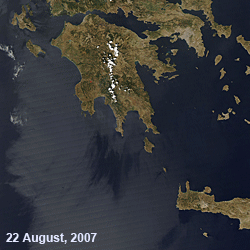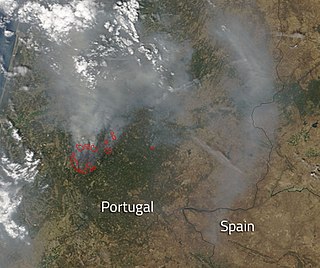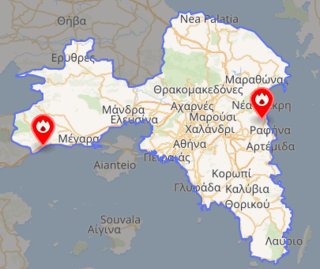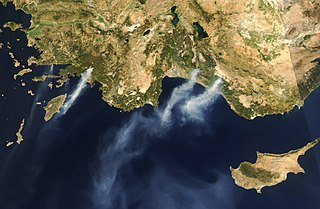
The 2007 Greek forest fires were a series of massive forest fires that broke out in several areas across Greece throughout the summer of 2007. The most destructive and lethal infernos broke out on 23 August, expanded rapidly and raged out of control until 27 August, until they were finally put out in early September. The fires mainly affected western and southern Peloponnese as well as southern Euboea. The death toll in August alone stood at 67 people. In total 85 people lost their lives because of the fires, including several fire fighters.
The Great Fire of Valparaíso started on 12 April 2014 at 16:40 local time, in the hills of the city of Valparaíso, Chile. The wildfire destroyed at least 2,500 homes, leaving 11,000 people homeless. An additional 6,000 people were evacuated from the city, which was placed on red alert and declared a disaster zone. Fifteen people were confirmed killed and ten suffered serious injuries.

The October 2007 California wildfires, also known as the Fall 2007 California firestorm, were a series of about thirty wildfires that began igniting across Southern California on October 20. At least 1,500 homes were destroyed and approximately 972,147 acres of land was burned from Santa Barbara County to the U.S.–Mexico border, surpassing the October 2003 California wildfires in scope, which were estimated to have burned 800,000 acres (3,200 km2). The wildfires killed a total of 14 people, with nine of them dying directly from the fires; 160 others were injured, including at least 124 firefighters. At their height, the raging fires were visible from space. These fires included the vast majority of the largest and deadliest wildfires of the 2007 California wildfire season. The only wildfire in 2007 that surpassed any of the individual October 2007 fires in size was the Zaca Fire.

The 2016 Portugal wildfires are a series of wildfires that burned across mainland Portugal and the Madeira archipelago in the north Atlantic Ocean during August 2016 that prompted the evacuation of more than one thousand people and destroyed at least 37 homes near Funchal on Madeira island. Flights were also disrupted at Cristiano Ronaldo International Airport due to high levels of smoke.

Numerous fires throughout Israel in November 2016

A series of four initial deadly wildfires erupted across central Portugal in the afternoon of 17 June 2017 within minutes of each other, resulting in at least 66 deaths and 204 injured people.

The 2017 wildfire season involved wildfires on multiple continents. On Greenland, which is mostly covered by ice and permafrost, multiple fires occurred in melted peat bogs, described as "unusual, and possibly unprecedented". Popular media asked whether the wildfires were related to global warming. Research published by NASA states "climate change has increased fire risk in many regions", but caused "greater severity in the colder latitudes" where boreal and temperate forests exist, and scholars have described "a warm weather fluctuation that has become more frequent in recent decades" related to wildfires, without naming any particular event as being directly caused by global warming.

A series of wildfires in Greece, during the 2018 European heat wave, began in the coastal areas of Attica in July 2018. 104 people were confirmed dead from the Mati fires. The fires were, at that time, the second-deadliest wildfire event in the 21st century, after the 2009 Black Saturday bushfires in Australia that killed 173.

During August 2019, a number of forest fires broke out in the Canary Islands of Gran Canaria, Tenerife and Lanzarote. The fires on the island of Gran Canaria were the most severe, resulting in the loss of large areas of the island's forests and leading to the evacuation of thousands of residents from a number of towns and villages. The intense heat brought by a heat wave and the presence of strong winds, combined with the island's mountainous terrain, made extinguishing activities exceptionally difficult.

The 2020 Córdoba wildfires are a series of wildfires burning through the Córdoba Province in Argentina.

In July and August 2021, a series of more than two hundred wildfires burnt 1,700 square kilometres of forest in Turkey's Mediterranean Region in the worst-ever wildfire season in the country's history. The wildfires started in Manavgat, Antalya Province, on 28 July 2021, with the temperature around 37 °C (99 °F). As of 9 August 2021, two fires were still burning, both in Muğla. The fires are part of a larger series of wildfires, including those in neighbouring Greece, originating from a heatwave made more likely by climate change.

The 2021 Greece wildfires were multiple wildfires in Greece in August 2021, which killed 3 people, injured at least 20 others and burned dozens of homes, after a historic heatwave for the country, with the highest temperatures reaching 47.1 °C (116.8 °F). Authorities evacuated several villages and towns. According to BBC News, Greece experienced the worst heatwave since 1987. These fires were the worst fires in Greece since the 2007 Greek forest fires which burnt more than double the area of the 2021 fires.

In June through August 2022, parts of Europe, the Middle East and North Africa were affected by wildfires. The bulk of the fires affected Mediterranean Countries, with the main areas affected being Algeria, France, Greece, Portugal and Spain.

Starting on 30 January 2023, a series of wildfires began in the South American country of Chile. By early February, the fires had developed into a large outbreak of at least 406 individual fires, several dozen of which were classified as "red alert fires". The fires burned more than 430,000 hectares and resulted in the loss of 24 lives, prompting the government to declare a state of emergency in multiple regions of the country.

In February 2024, a series of wildfires broke out in Chile, affecting multiple regions including Valparaíso, O'Higgins, Maule, Biobío, and Los Lagos. The most severe incidents occurred in the Valparaíso Region as of 5 February 2024. The Chilean government labeled the fires as the country's worst disaster since the 2010 Chile earthquake, and declared a two-day national mourning period.

In July 2023, multiple wildfires started in Greece. They resulted in at least 28 deaths and injured 75 people, with over 80 wildfires being recorded. Seventy-nine people were arrested for arson.

Multiple wildfires broke out across Italy in the summer of 2021. The first wildfires were reported in Sardinia on 24 July, which would go on to become one of the worst affected regions along with Calabria, where five people died, and Sicily, which recorded one further fatality. Wildfires in Lazio on 17 August damaged the estate of the presidential summer residence.

On 15 August 2023, a forest fire broke out on the island of Tenerife, in the Canary Islands of Spain. The fire, driven by the wind, heat, and low humidity levels, caused mass evacuations, widespread damage to the island's flora and fauna, as well as power and water supply cuts in some of the affected municipalities.



















